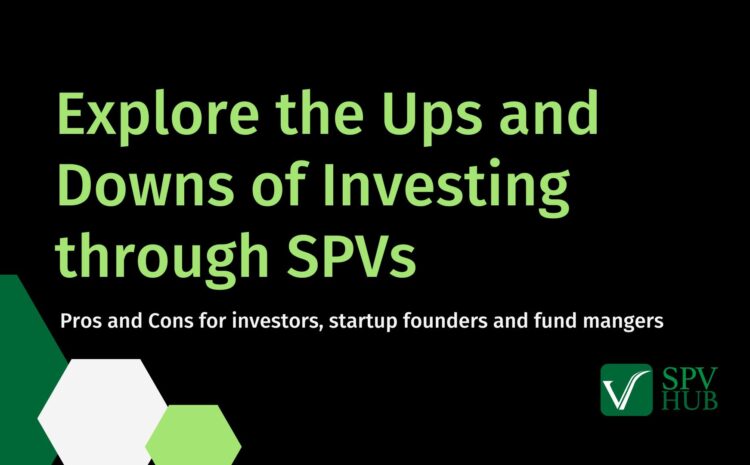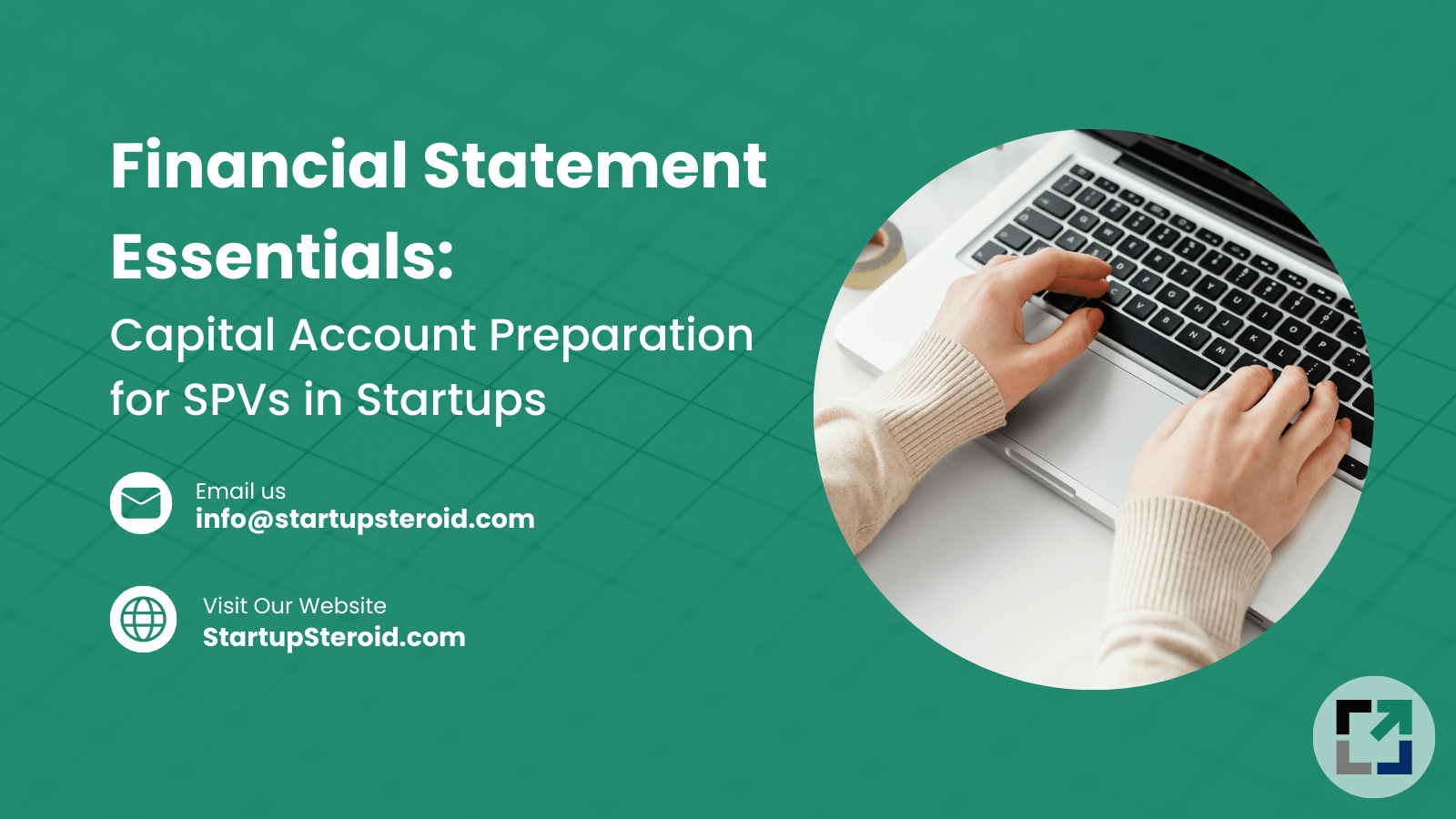CONTENTS:
- Introduction
- What is an SPV?
- How are SPVs different from venture capital?
- SPVs for Angel Investors – Pros and Cons
- SPVs for Startup Founders – Pros and Cons
- SPVs for Fund Managers – Pros and Cons
- About SPV Hub
Introduction:
Investing in startups is an exciting and lucrative way to diversify your investment portfolio. As an angel investor, you can support innovative new companies and potentially reap the rewards of their success. However, investing in startups can also be risky, and finding the right investment opportunities can be challenging.
One way to mitigate some of the risks associated with startup investing is through a Special Purpose Vehicle (SPV). In this blog, we will explore what SPVs are, how they differ from traditional venture capital, and the pros and cons of investing through SPVs for angel investors, startup founders, and fund managers.
What is an SPV?
A Special Purpose Vehicle (SPV) is a legal entity created specifically for a single investment. SPVs are typically used to pool capital from multiple investors and invest that capital into a specific asset or group of assets. In startup investing, SPVs are often used to invest in a single startup or a small group of startups.
How are SPVs different from venture capital?
Traditional venture capital funds pool capital from a group of investors and invest that capital into a portfolio of startups. In contrast, SPVs are typically created for a single investment, and the investors in the SPV only invest in that specific startup or group of startups. This can give investors more control and transparency over their assets, as they know precisely which startups their capital is being invested in.
SPVs for Angel Investors – Pros and Cons
First off, pooling your investment with others allows the syndicate to secure larger allocations and better terms. Most startups will only take a small $5k or $10k check, as it creates too much work for them regarding cap table management and legal fees. However, when you invest through a syndicate with 35 other investors, that $10k becomes $350k, and the founders take you seriously. The syndicate lead can then negotiate on behalf of the group for pro rata, information rights, and other terms.
Another significant advantage of investing through an SPV is access to more companies and a better chance of outlier success. The more startups you look at, the higher the likelihood you stumble across the next Slack, Instacart, or Zoom. As an Angel investor, I constantly look for top startups and founders. I am continually looking to meet and network with the most driven founders building the most game-changing businesses of tomorrow.
Furthermore, most syndicate leads provide a detailed deal memo of every company they invest in, outlining the terms of the deal, the potential risks, and upside, and why they believe it’s a good investment. These analyses can be invaluable, especially as you first get into angel investing. Because every founder is charismatic and “going to change the world.” Cutting through that polished veneer to get to the heart of the business and whether or not it’s a good investment is a craft that takes lots of practice.
Investing through an SPV also provides the opportunity to network with other investors. One of the best ways to meet other angel investors and increase your deal flow is by investing alongside other top investors. And a syndicate / SPV is undoubtedly the easiest way to do that. In an SPV, you can have 249 other angels… who knows who you’ll invest alongside.
Lastly, SPVs are great for individual investors because there are no complicated terms, working with lawyers or managing entities or investments. It’s just a few signatures and a bank wire, and the syndicate (supported on the backend by SPV Hub) handles the rest – including K1s and tax forms at the end of the year.
Pros:
- Reduced risk: By investing through an SPV, angel investors can pool their capital with other investors, reducing the amount of capital that any individual investor needs to commit to the investment.
- More control and transparency: As mentioned above, investing through an SPV can give investors more control and transparency over their investments, as they know exactly which startups their capital is being invested in.
- Access to more investment opportunities: SPVs can allow angel investors to access investment opportunities that they might not otherwise be able to access on their own.
Cons:
- Potential for conflicts of interest: SPVs are typically managed by a lead investor or group of investors, which can create conflicts of interest if those investors have competing interests with the other investors in the SPV.
SPVs for Startup Founders – Pros and Cons
Pros:
- Simplified fundraising: By working with an SPV, startup founders can simplify their fundraising process by only dealing with a single entity.
- Access to a broader range of investors: SPVs can allow startup founders to access a wider range of investors than they might otherwise be able to access on their own.
- Potentially faster fundraising: SPVs can often make investment decisions more quickly than traditional venture capital funds, which can lead to faster fundraising.
Cons:
- Less control over investor pool: By working with an SPV, startup founders give up some control over who their investors are and how those investors are structured.
SPVs for Fund Managers – Pros and Cons
Fund managers who are considering using an SPV as an investment vehicle should carefully weigh the pros and cons before making a decision. While SPVs can offer more flexibility and potential for higher returns, they also come with challenges, such as increased risk.
Pros:
- More flexible investment structure: SPVs can be structured in a variety of ways, which can allow fund managers to create investment structures that are tailored to the needs of their investors.
- Reduced administrative burden: SPVs can often have lower administrative burdens than traditional venture capital funds, which can make them easier to manage.
- Potential for higher returns: By investing through an SPV, fund managers may be able to access investment opportunities that have the potential for higher returns than traditional venture capital investments.
Cons –
- Less diversified portfolio: Since SPVs are typically focused on a single investment opportunity, fund managers may have a less diversified portfolio compared to traditional venture capital funds.
- Increased risk: Investing through an SPV can also come with increased risk, as the success of the investment is often dependent on the success of a single company.
About SPV Hub
SPV Hub provides the best of SPV services. We specialize in Delaware Series LLC, providing benefits of limited liability and flexibility in structure, keeping the complexities away from the fundraising process.
With SPV Hub, you can be confident that you’re following all the mandates and securing your funds. SPV Hub is a fintech platform to manage syndicate deals more efficiently. Are you looking for an SPV provider? Book a demo today to learn how SPV Hub can be the perfect partner.
Register as an investor here.
Want to set up an SPV? Feel free to get in touch with us via email
Disclaimer: The information provided is for educational and informational purposes only and should not be construed as financial or investment advice. Always research and/or consult a qualified financial advisor before making investment decisions.









